Since December 1, 2021, important new rules and pricing have been in effect for the Hanauma Bay Nature Preserve (HBAY). Just a 25-minute drive from Waikiki, the popular snorkeling spot is a spectacular cove formed from a volcanic crater, and is teeming with marine life. But don’t show up without a reservation! Read on below for how to obtain yours.
With all the discussion in Hawaii about increased visitor fees, this iconic Hawaii destination has been testing new rules and the latest increase in visitor rates for a year and a half now. In 2016 the entry fee at Hanauma Bay was 5$ a person. By 2020 it had risen to 12$, and the latest changes have more than doubled that, bringing it to $25 per person. The City of Honolulu says that the money raised will go directly to management and improvement at Hanauma Bay.
Hanauma Bay is now open Wednesdays through Sundays, with daily entrance available for a maximum of 1400 visitors from 645 am to 130 pm. All visitors must depart by 4 pm, and the beach will be cleared at 330 pm. As the schedule is subject to change, it is suggested that visitors call to inquire at (808) 768-6861.
New mandatory online visitor reservations.
Entrance to Hanauma Bay is via a specific time reservation made and paid for online. Entry payments are not refundable unless the nature preserve is closed at your scheduled time of entrance.
Visit the Honolulu Parks & Recreation website for reservations (up to 5 adults and 5 children). The cost for visitors is $25 per person aged 13 and above, plus a 2.35% online processing fee.
Tickets are not transferable and all sales are final. There are no cancellations or exchanges. Visitors will receive an email confirmation. A valid photo ID matching the reservation is required at entry. “Unauthorized use of reservations will void the reservation without refund.”
Make mandatory online reservations two days in advance.
The reservation system permits selecting a video “show-time” 48 hours prior to your planned visit to Hanauma Bay. “Reservations will remain open until the spaces are filled or until midnight the day before, so reservations for Wednesday will close after 11:59 p.m. (HST) the preceding Tuesday.”
Required video viewing prior to entrance.
All visitors will need to watch the educational video in the Hanauma Bay theatre each time they visit. Even if you’ve seen the video before, it will still be required.
Parking is cash and in-person.
Hanauma Bay parking fees are collected when you arrive and are made in cash. The fee for parking is $3 for visitors and $1 for residents.
Be aware that bus service to the bay has been suspended since Covid 19; if you’re ok with a little bit of a walk, you can still take the bus to the Koko Marina shopping center and hoof it the rest of the way (about a mile).
Bring your own equipment or rent it there.
The rental concession for fins and masks has reopened. The fee is $20 per day per set. Lockers are also available.
Some flexibility for those without technology?
At least at the present time, a “limited amount of walk-in or drive-in access without an online reservation will continue to be allowed. On-site payment for entry is available.” What the limit is or how long it may continue for those without internet access, is not clear. Previously the city had said that up to 25% of the tickets might be available in person, but that is no longer clear.
Rules for Hawaii residents and the military are different.
Residents of Hawaii with valid IDs can visit without reservations during public hours of operation. Military members and their dependents get free entry with their military IDs.
Other important rules.
No outside commercial activities, including tours, are allowed on the premises, and taxis may not transport visitors into Hanauma Bay.
Concession hours.
The gift shop is open from 8 am until 330 pm, the food concession is open from 830 am until 2 pm, and the snorkel gear shop is open from 7 am until 3 pm.
Please let us know your thoughts on the Hanauma Bay visitor rates and other rules.
CoconutWilly from Honolulu wrote to us saying, “Oahu just implemented a $25 fee for Hanauma Bay. I have been in the hospitality industry here in Hawaii for 35 years. I disagree with price gouging the tourists to balance the budget. I always put myself in the other person’s shoes. A family of 4 needs to fork over another $100 to go to Hanauma? Forget it! HTA, your tactics to limit visitors are working!”
While $25 per person may not seem like a dramatic increase, it is more than double the prior rate. And, it comes at a time when visitor fees are under extreme scrutiny.
Honolulu Department of Parks and Recreation’s View.
Honolulu DPR spokesperson Nate Serota said that “all the money that’s made from the entrance fees goes back into the maintenance, the education, the conservation efforts. So we need to maintain that source of funding in order to keep it the thriving attraction, not just for recreational enjoyment, but for conservation and to make it such a beautiful place in perpetuity.”
The city said that it is “looking at different ways to have revenue come in and one of the big things with Hanauma Bay is it’s free for locals and we charge the non-local residents to enter the bay.” The city plans to use this “visitors pay” but “locals do not” concept at other facilities soon.
“Providing a safe & enjoyable experience for bay visitors, while keeping the preserve’s conservation and fiscal sustainability objectives in mind, continues to be our ultimate goals…The ticketing system and increased access to the preserve’s parking lot proved to be the solutions we needed. ” –DPR Director-Designate Laura H. Thielen.
Hanauma Bay Nature Preserve was closed for 9 months due to COVID.
Hanauma Bay has always been one of the state’s primary snorkeling attractions for both visitors and residents. In the past, such throngs would come to see the beauty both above and below the water that they appeared to outnumber the marine creatures.
After it was closed due to COVID in March of 2019, the bay started to heal following decades of abuse. Water quality and clarity improved without the visitors, their sunscreen, and the bread and other food they fed the fish. The marine ecosystem and its plethora of colorful coral and fish have since clearly begun to restore. Endangered species found there including sea turtles and monk seals have been seen in greater numbers.
Hanauma is the first Marine Life Conservation District in Hawaii and is considered one of Hawaii’s most breathtaking natural resources. Now you can be part of preserving and protecting one of the state’s rarest locations. The bay features both a deep outer reef and a shallow inner reef for protection, which results in calm, sparkling-clear waters.
Tip: Be aware that there is an unofficial website that looks official which is hanaumabaystatepark.com. We won’t link to that one. Here is the official state website for Hanauma Bay.
Visitors and locals previously imperiled Hanauma Bay.
Prior to the first efforts to limit visitors in 1990, by instituting entry fees and limiting the number of tour buses, it was inundated by over 3 million visitors a year. In the years before COVID, Hanauma Bay saw up to 6,000 visitors per day, but with the new regulations, the daily visitor count is in the range of 1400-2000.
That is the not-for-profit organization that closely monitors everything happening within the bay. Their president, Lisa Bishop, said that water visibility had improved 64% since before the COVID shutdown. She also noted that it was the first time in four decades that dangerous sunscreen chemicals had not been in the water.
Since the closure, larger species and an abundance of tropical fish have returned making it worth the wait to enter.
Pristine ecosystems in recovery
More than a decade ago, new efforts got underway to restore Hanauma Bay. Due to long-term abuse and overuse, with millions of annual visitors, 30 years ago Honolulu unveiled a plan to restore the bay by implementing restrictions including visitor counts, and the creation of educational programs. Then in 2002, the Hanauma Bay Marine Education Center opened. It is there that visitors watch a short video supporting efforts to restore this special place when we visit. Further back, in 1967, Hawaii first designated the 100-acre Marine Life Conservation District.
Sunscreen at Hanauma Bay.
Hawaii has banned sunscreens deemed unsafe. There is a prohibition on the sale and distribution of sunscreens that contain oxybenzone and octinoxate. These are chemicals that are found in thousands of sunscreens. This law became effective on January 1, 2021.
“Our natural environment is fragile, and our own interaction with the earth can have lasting impacts…. This new law is just one step toward protecting the health and resiliency of Hawaii’s coral reefs.” — Governor David Ige.
Updated July 20, 2023
Get Breaking Hawaii Travel News
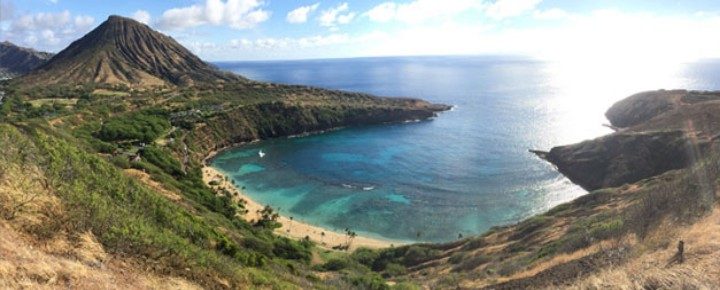
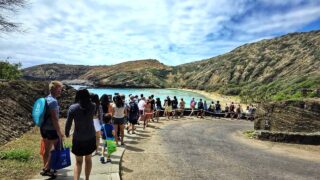

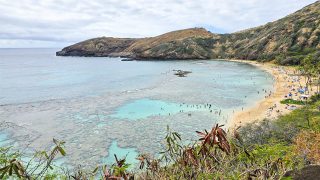
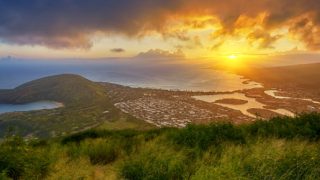
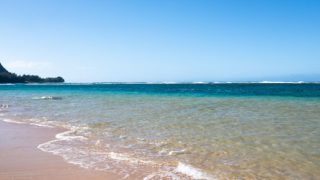
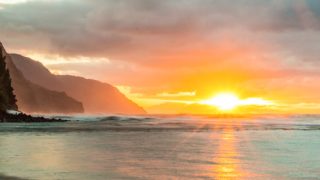
If visitors in general would respect the eco system, these things wouldn’t be necessary. We have too many people ruining it for everyone. I would pay fees that improve areas and limit entry to precious areas. Respect Mother earth!
Have to agree with the comments on here. It’s 100% price-gouging of tourists. Shame on you HTA. I get the recovery from Covid, but this is ridiculous exploitation. Go to Shark’s Cove for snorkeling. Add to that- the staff is rude, yell at you at check-in & treat you like you’re not worthy to be at their nature preserve.
I visited Hanauma Bay many years ago when there was no entry fee (and Maybe no parking fee). No matter how much money I had, I’d never pay the new, exhorbitant fees! We certainly will never again visit Hanauma Bay.
My wife & I (79 & 70) have been saving for years for our final Hawaii visit, but we now have only Social Security as income, so we are re-thinking ever visiting again. At home in Northern California, we have to depend on a food bank for most of our food.
There also seem to be No senior discounts anywhere in Hawaii. So much for the Aloha Spirit we used to enjoy when we owned a Kaua’i timeshare before Hurricane Iniki resulted in us losing it. After 14 visits, we’ve had it!
There should be a new policy of refund and cancelation fees regarding the time limitation of visit and parking spots as well now the government decided to double the entrance fee. It doesn’t make sense to arrive on time, find a parking spot and reserve your ticket in advanced. Yea, that’s a perfect plan.
Good luck
Does the military exemption for entrance fee including retirees or veterans or only active duty?
Not sure if I understand the rules. We do need to make reservations and, if so, how far in advance can we do it?